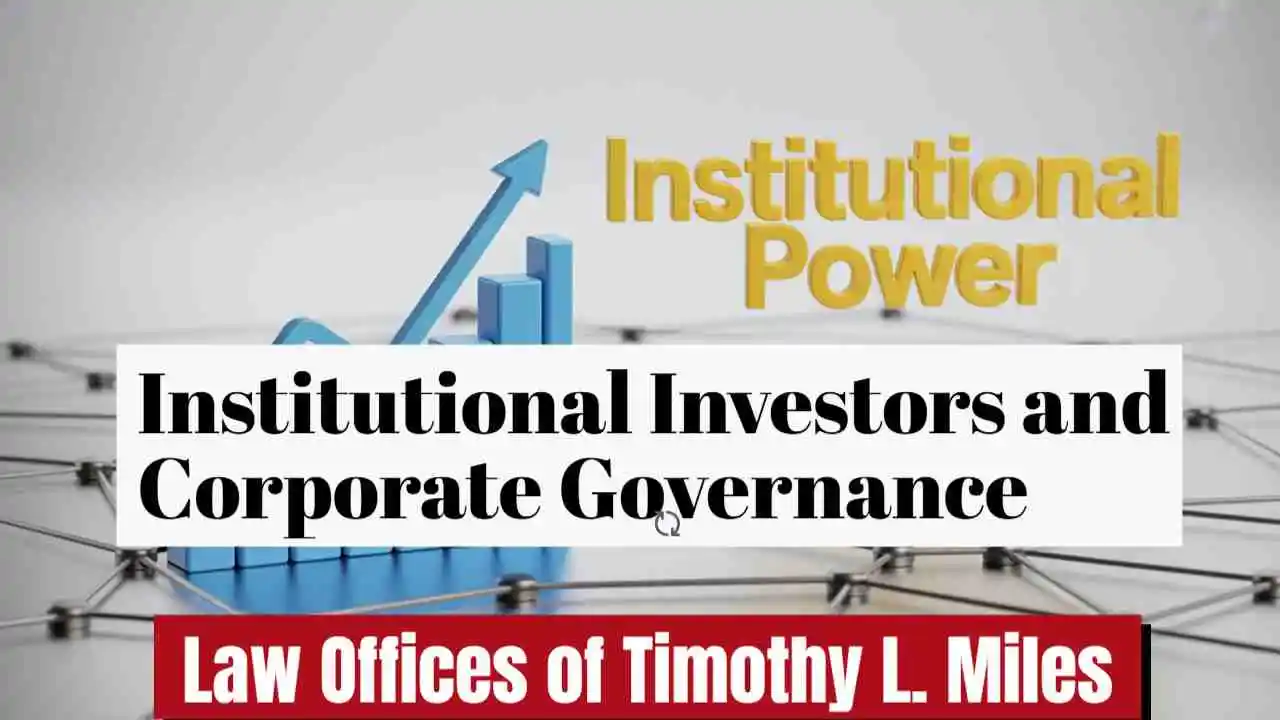Introduction to Institutional Investors and Corporate Governance in Securities Litigation

Institutional investors have increasingly become pivotal players in the realm of corporate governance, particularly in the context of securitie fraud litigation. As large entities such as pension funds, mutual funds, and insurance companies, institutional investors wield substantial influence over corporate practices and policies.
Their significant ownership stakes in publicly traded companies enable them to exercise considerable control and advocate for the implementation of robust governance frameworks. This authoritative investor guide aims to elucidate the crucial role that institutional investors play in shaping corporate governance mechanisms, especially as they pertain to securitie fraud litigation.
The symbiotic relationship between institutional investors and corporate governance is one that continues to evolve, driven by the need for transparency, accountability, and ethical conduct within corporations. Institutions are not merely passive shareholders; they actively engage with company management to ensure that their investments are safeguarded and that companies adhere to best practices in governance.
In securities litigation, these investors often take on a leading role, either by initiating lawsuits or by influencing corporate policies to preempt potential legal challenges. Their involvement is crucial in holding corporations accountable for fraudulent activities, financial misstatements, and other malfeasances that can harm shareholder value.
Moreover, the presence of Institutions in corporate changes to governance can lead to more stringent oversight and better risk management practices within corporations. By advocating for comprehensive disclosure requirements and ethical business conduct, institutional investors help mitigate risks that could lead to securities litigation.
Their substantial resources and expertise enable them to conduct thorough due diligence and engage in meaningful dialogue with corporate boards. This proactive stance not only protects their investments but also promotes long-term sustainability and resilience within the corporate sector.
In conclusion, institutional investors play a preeminent role in enhancing governance through their active participation in securities litigation. Their ability to influence corporate policies and practices is instrumental in fostering an environment of accountability and ethical conduct. As we look towards 2025, the importance of institutional investors in shaping corporate governance is expected to grow, further solidifying their status as authoritative figures in the realm of securities litigation.
This guide serves as an invaluable resource for understanding the dynamic interplay between institutional investors and corporate governance, providing insights into their critical contributions to ensuring the integrity and stability of financial markets.
The Importance of Institutional Investors

Institutional investors play a critical role within the financial markets due to their significant influence and substantial capital reserves. These entities, which include pension funds, insurance companies, and mutual funds, among others, manage large pools of assets on behalf of their clients. Their involvement in the market not only enhances liquidity but also helps stabilize prices through their long-term investment strategies and rigorous analysis.
Institutions are often seen as key drivers of corporate governance, as they have the power to influence management practices and business strategies through active engagement and voting rights. This stewardship role is crucial in ensuring that companies adhere to high standards of transparency, accountability, and ethical behavior.
In addition to their primary investment functions, institutional investors play a pivotal role in securities fraud class action lawsuits. These lawsuits typically arise when there are allegations of corporate misconduct or fraudulent activities that have led to significant financial losses for investors. As major stakeholders, Institutions often lead these legal actions to seek redress and hold companies accountable.
Their involvement is essential in such lawsuits because they possess the resources and expertise necessary to navigate complex legal landscapes and effectively represent the interests of all affected shareholders. By actively participating in securities fraud class action lawsuits, institutional investors contribute to a more equitable financial system where companies are held accountable for their actions.
Furthermore, the presence of Institutions in securities fraud class action lawsuits serves as a deterrent against corporate malfeasance. Companies are likely to be more cautious and adhere to legal and ethical standards when they know that powerful institutional investors are closely monitoring their actions and are prepared to take legal action if necessary. This proactive stance not only protects the interests of individual investors but also promotes overall market integrity.
In conclusion, the importance of Institutions extends beyond their financial contributions to the market. Their, fostering a healthier and more stable economic environment. As they continue to wield considerable influence within the financial sector, institutional investors will remain instrumental in shaping the future of corporate practices and market dynamics.
Advantages of Institutional Participation
- Resource Availability: Institutions typically have the resources to conduct thorough investigations and can afford to hire experienced legal counsel to navigate the complexities of securities law.
- Long-Term Commitment: These investors often have a long-term interest in the companies they invest in, which motivates them to pursue litigation that can lead to governance reforms and better corporate practices along with investor protections for the entire class of shareholders.
- Enhanced Credibility: The involvement of institutional investors can lend credibility to a class action lawsuit, potentially leading to more favorable outcomes.
Monitoring and Governance
Institutions also serve a monitoring function, ensuring that companies adhere to legal and ethical standards. When management fails to comply with their demands, these investors can exert their influence by filing proxy resolutions or engaging in litigation therby providingn robust investor protection. This monitoring role is essential for protecting the interests of all shareholder.

The Impact of Institutional Investors on Litigation Outcomes
Research indicates that institutions serving as lead plaintiffs are associated with more favorable litigation outcomes. This includes a lower likelihood of case dismissal and larger settlement amounts.
Immediate Litigation Outcomes
Institutions lead plaintiffs tend to achieve better immediate outcomes in terms of financial recoveries. Their larger financial stakes and greater resources enable them to impose more significant penalties on defendant firms.
The Ability to Influence Litigation Outcomes and Advocate for Improved Corporate Governance Practices
Key aspects
- Securities fraud class actions: Institutional investors often serve as lead plaintiffs in securities fraud class action lawsuits, representing the interests of a larger group of investors. Their involvement can increase settlement amounts and lead to more favorable outcomes.
- Corporate governance: Institutions act as monitors, ensuring that companies adhere to legal and ethical standards. Institutional Investors can influence corporate governance through proxy resolutions, filings, and even litigation when necessary. Research indicates that institutional investors promote practices like greater board independence and expertise.
- Shareholder activism: Institutions are a driving force behind shareholder activism, using their influence to push for changes in corporate governance, strategy, and operations. They can challenge management decisions, demand transparency, and drive reforms.
Trends and considerations
- Lead plaintiff: The PSLRA encourages Institutions to act as lead plaintiffs in securities fraud class actions lawsuits by establishing a presumption that the investor with the largest financial stake in a lawsuit is the “most adequate plaintiff”.
- Fiduciary duty: Institutional investors are increasingly recognizing their fiduciary duty to monitor portfolio companies for potential fraud or mismanagement and to consider legal action when warranted.
- Impact of activism: Shareholder activism, particularly concerning environmental, social, and governance (ESG) issues, can influence litigation outcomes and drive companies towards more sustainable practices.
Recommendations for institutional investors
- Establish policies: Because Institutions can influence internal governance, develop clear policies for addressing securities litigation and governance issues.
- Monitor and engage: Actively monitor portfolio companies’ governance practices and engage with management when necessary.
- Evaluate litigation: Carefully assess the merits of participating in securities fraud class actions or pursuing individual claims, weighing the potential benefits against the costs and risks.
Examples of How Institutional Investors Can Influence Corporate Governance through securities litigation
- ExxonMobil and Engine No. 1 (2021): Engine No. 1, a relatively small activist hedge fund, led a successful proxy fight at ExxonMobil, pushing for a greater focus on climate change and a transition away from fossil fuels.
- Despite holding only a 0.02% stake, Engine No. 1 successfully gained three board seats, demonstrating the increasing power of ESG (environmental, social, and governance) factors in shareholder activism.
- This success was attributed to the support of major institutional investors like BlackRock, Vanguard, and State Street, as well as proxy advisors.
- The campaign, focused on aligning ExxonMobil’s strategy with climate goals, was viewed as a significant victory for environmentalists and ESG investors.
- Starbucks and Elliott Investment Management (2024): Elliott Investment Management’s campaign at Starbucks led to a change of CEO and a significant increase in the company’s stock value.
- Elliott, holding a substantial stake, privately pushed for a strategic overhaul, resulting in the appointment of a new CEO and positive market reaction.
- This campaign exemplifies how activists can drive change by combining strategic demands with a focus on leadership and shareholder value.
- Southwest Airlines and Elliott Investment Management (2024): Elliott also engaged in a more public campaign at Southwest Airlines, advocating for board and leadership changes and a comprehensive business review.
- The campaign led to the appointment of five independent directors nominated by Elliott and the accelerated retirement of the chairman.
- This highlights the effectiveness of public activism in achieving governance reforms and management changes.

Emerging Trends in Activism
1. M&A and structural changes remain a core focus
- Despite a challenging M&A environment in the past, shareholder activism continue to agitate for deals, including advocating for outright sales or divestitures.
- A potential M&A rebound could provide a fresh opportunity for activists to push for transactions as a means of unlocking value.
- Those in participate in shareholder activism are increasingly looking at spin-offs and break-ups as a way to create shareholder value by capitalizing on potential trading multiples and streamlining businesses.
2. Intensified focus on operational efficiency and profitability
- Activism is moving beyond M&A as a primary objective and increasingly emphasizing operational improvements and cost-cutting initiatives to enhance profitability and margins.
- This approach typically involves a longer investment horizon (1-3 years or more) and a focus on deeper operational analysis and strategic partnerships with management.
3. ESG remains a relevant, but evolving, factor
- While ESG (Environmental, Social, and Governance) factors continue to be a focus, especially for long-term institutional investors, some studies suggest a decline in the number of purely ESG-focused campaigns.
- ESG is still used strategically by activists to garner support from institutional investors and potentially improve long-term value,
- The “G” (governance) within ESG is receiving renewed attention, with a focus on board expertise in environmental and social issues, as well as the board’s role in overseeing ESG-related disclosures.
- However, anti-ESG backlash and differing views on the link between ESG and financial performance introduce complexities,
4. Universal proxy card is shaping activism tactics
- The universal proxy card, which lists all director candidates on a single ballot, is impacting proxy fights and leading to faster settlements as a result of shareholder activism.
- Activists are leveraging this tool to target individual directors and push for more specific changes to board composition and governance.
5. Increased participation of “first-time” and non-traditional activists
- The landscape of activism by shareholders is broadening beyond traditional activist hedge funds.
- First-time activists and a wider range of investors, including institutional investors and minority shareholders, are using activist tactics to influence corporate decisions and challenge boards.
- This trend is driven by factors such as the universal proxy, increased transparency, and a growing recognition of the impact of ESG factors
6. Globalization of activism
- Activism is expanding globally, with increased activity in Europe and Asia, particularly Japan.
- Differences in governance practices and M&A environments in different regions are influencing activist strategies and target selection
Innovative Tactics in Activism
Shareholder activism is evolving beyond traditional proxy fights and public campaigns. Here are some innovative tactics being employed:
1. Blending financial and non-financial objectives
- Activists are increasingly integrating environmental, social, and governance (ESG) factors into their financial arguments.
- For example, Engine No. 1, a small hedge fund, successfully pushed for ESG-focused board members at ExxonMobil by framing climate issues as economic issues that would impact long-term shareholder value.
2. Leveraging data analytics and digital tools
- Activists are utilizing sophisticated data analysis and third-party consulting services to analyze target company strategies, financials, operations, and ESG impact.
- This allows them to develop more compelling and fact-based arguments for change.
- They also employ digital platforms and social media campaigns to reach a broader range of shareholders, including retail investors, and amplify their messages.
3. Focusing on operational efficiency and profitability
- Activists are increasingly targeting companies withhigh operating costs or perceived inefficiencies and pushing for operational improvements and cost-cutting measures to enhance profitability.
- This approach often involves a longer investment horizon and a focus on deeper operational analysis.
4. Adapting to the universal proxy card
- The universal proxy card, which lists all director candidates on a single ballot, has made proxy fights more nuanced.
- Activists are leveraging this tool to focus on individual director qualifications and push for specific changes to board composition.
- This can lead to more partial victories, with activists gaining some board seats rather than a complete overhaul.
5. Engaging in activism across the capital structure
- Activists are not solely focused on equity positions; they are also exploring activism through debt holdings and derivatives.
- This includes strategies like threatening to assert a default on debt covenants or acquiring positions sufficient to block shareholder votes on critical transactions.
Globalization of activism
- Activism is expanding beyond traditional markets like the US and UK, with increased activity in regions like Europe and Asia.
- Activists are adapting their tactics to regional variations in governance practices and legal frameworks.
7. “Stealth accumulations” and surprise attacks
- Activists sometimes build significant stakes in target companies without prior notice or engagement, using broker-dealers to conceal their holdings.
- This allows them to launch surprise attacks and potentially catch companies off guard,

The Future of Securities Fraud Litigation
As the market continues to evolve, the future of securities fraud class actions will likely be shaped by technological advancements, increased scrutiny of corporate practices, and the ongoing commitment of institutional investors to seek justice for their stakeholders.
Technological Advancements
The rise of data analytics and artificial intelligence may enhance the efficiency and effectiveness of securities fraud litigation. These tools can help institutional investors analyze vast amounts of data to identify potential fraud and assess the strength of their claims in securities class action lawsuits.
Ongoing Commitment to Investor Rights
Institutional investors are increasingly recognizing their role as advocates for investor rights. By participating in securities class actions, they can help ensure that companies are held accountable for their actions and that investors receive the compensation they deserve.
Key Takeways:
- The Importance of Institutional Investors: The importance of Institutions extends beyond their financial contributions to the market. Their role in driving corporate governance and participating in securities class action lawsuits ensures that companies remain accountable and transparent, fostering a healthier and more stable economic environment.
- The Impact of Institutional Investors on Litigation Outcomes: Research indicates that institutions serving as lead plaintiffs are associated with more favorable litigation outcomes. This includes a lower likelihood of case dismissal and larger settlement amounts.
- Institutional Investors Can Influence Corporate Governance: Institutions act as monitors, ensuring that companies adhere to legal and ethical standards. Institutional Investors can influence corporate governance through proxy resolutions, filings, and even litigation when necessary. Research indicates that institutional investors promote practices like greater board independence and expertise.
- Examples of How Institutional Investors Can Influence Corporate Governance through securities litigation: ExxonMobil and Engine No. 1 (2021): Engine No. 1, a relatively small activist hedge fund, led a successful proxy fight at ExxonMobil, pushing for a greater focus on climate change and a transition away from fossil fuels.
- Emerging Trends in Shareholder Activism: Shareholder activism is evolving rapidly, driven by shifts in the market, regulations, and investor priorities.
- Innovative Tactics in Shareholder Activism: Shareholder activism is evolving beyond traditional proxy fights and public campaigns.
- The Future of Securities Litigation:
- Technological Advancements
- Ongoing Commitment to Investor Rights
Conclusion
Securities fraud class action lawsuits represent a critical avenue for investors to recover losses resulting from corporate misconduct. Institutional investors play a pivotal role in these proceedings, leveraging their resources and experience to navigate the complexities of securities law. Whether choosing to participate in a securities fraud class action or opt out to pursue individual claims, investors must carefully weigh the advantages and disadvantages of each approach to securities litigation.
By understanding the mechanics of these class actions, assessing the strength of their claims, and staying informed about regulatory changes, institutional investors can make informed decisions that align with their financial objectives. As the landscape of securities fraud class actions continues to evolve, the commitment to advocating for investor rights remains paramount.
Contact Timothy L. Miles Today for a Free Case Evaluation
If you suffered substantial losses and wish to serve as lead plaintiff in a securities fraud class action or have questions about securities class action fraud lawsuits, or just general questions about investor protection, please contact attorney Timothy L. Miles of the Law Offices of Timothy L. Miles, at no cost, by calling 855/846-6529 or via e-mail at [email protected].(24/7/365).
Timothy L. Miles, Esq.
Law Offices of Timothy L. Miles
Tapestry at Brentwood Town Center
300 Centerview Dr. #247
Mailbox #1091
Brentwood,TN 37027
Phone: (855) Tim-MLaw (855-846-6529)
Email: [email protected]
Website: www.classactionlawyertn.com
Visit Our Extensive Investor Hub



